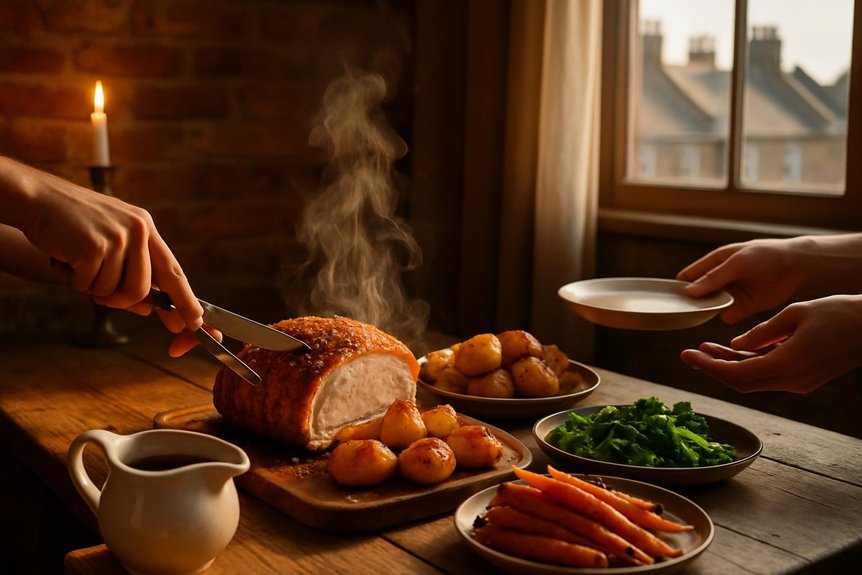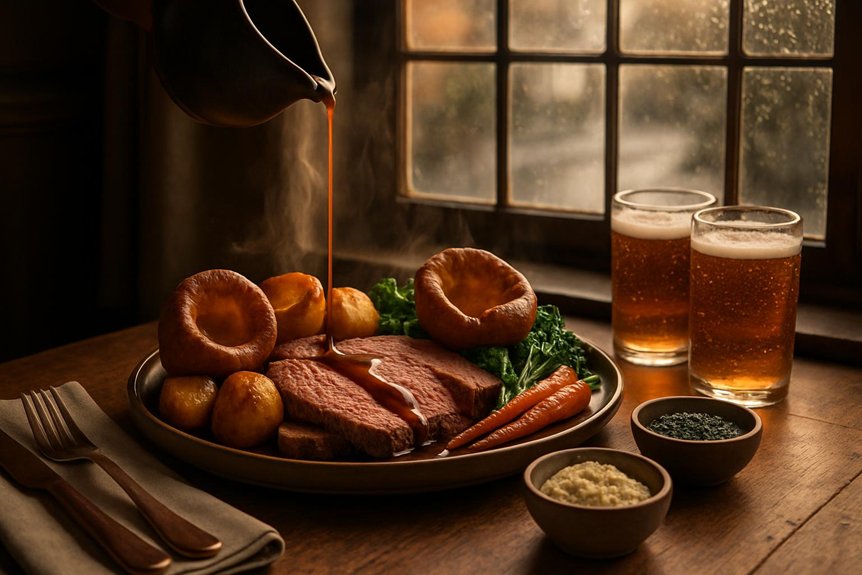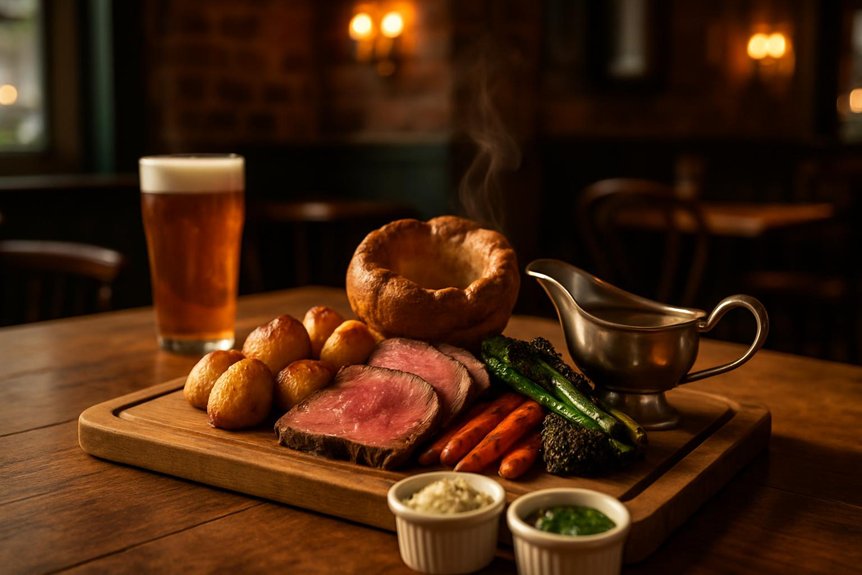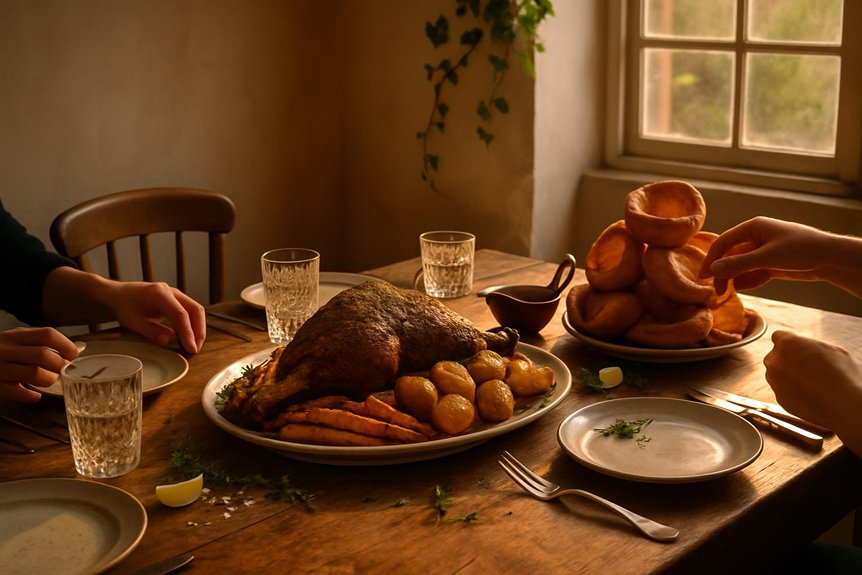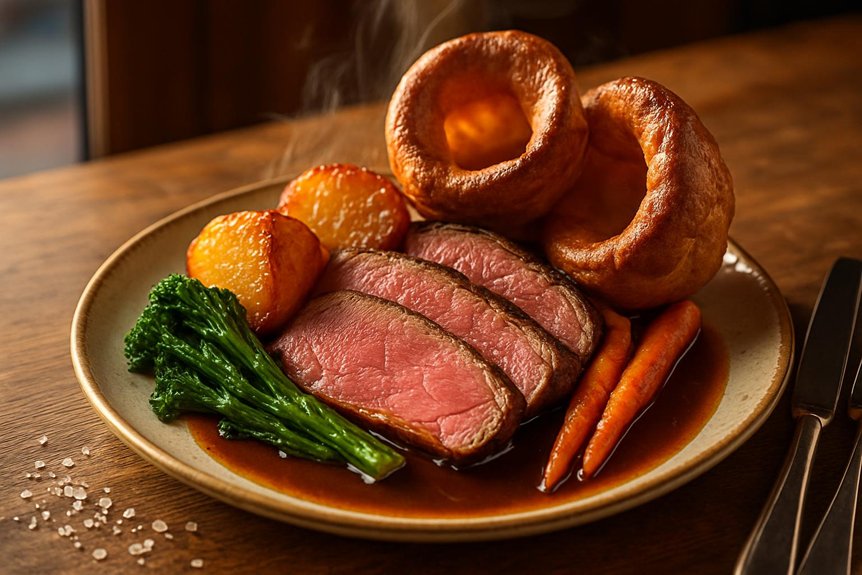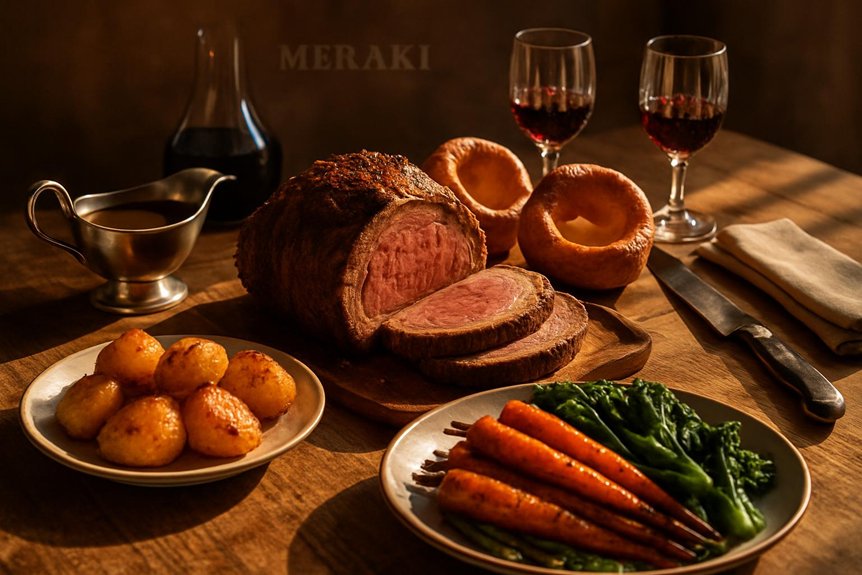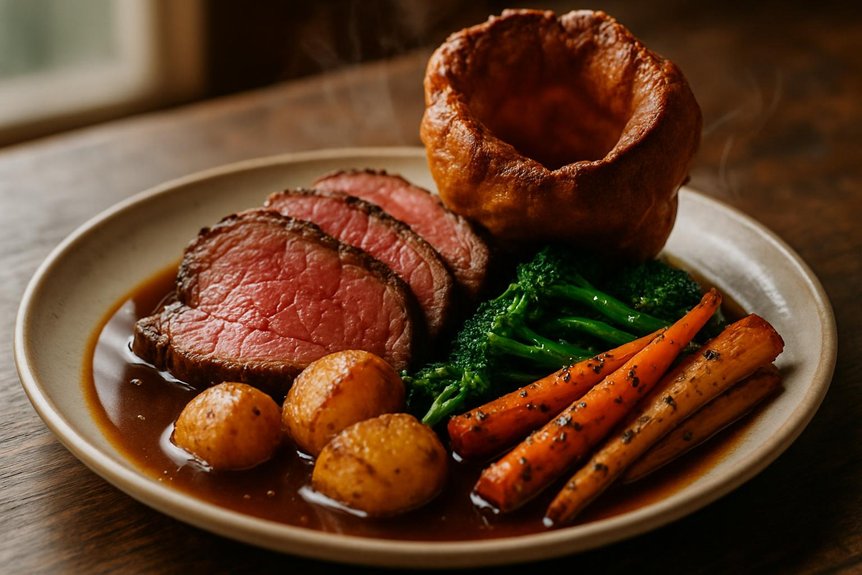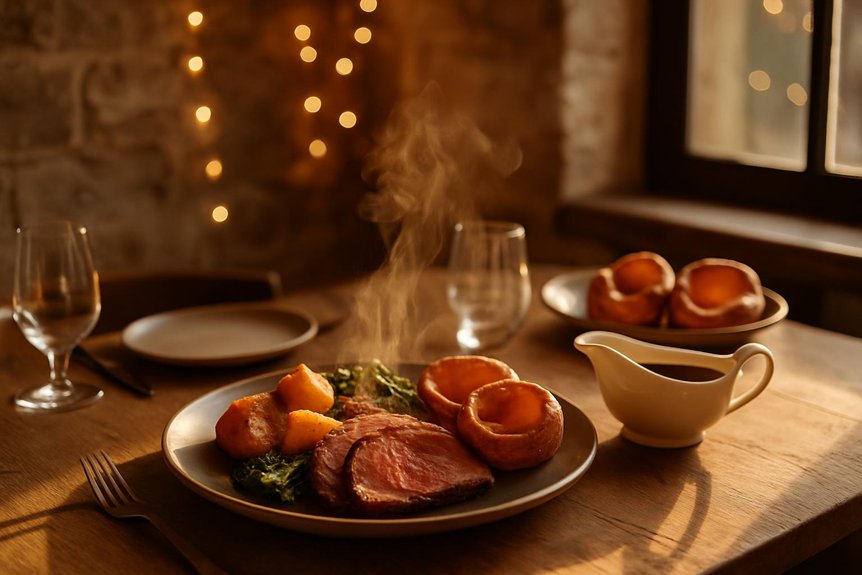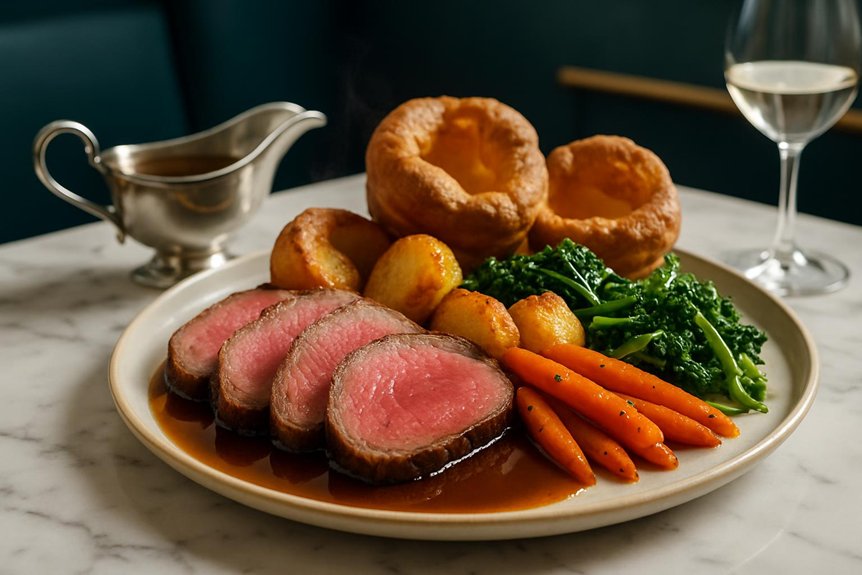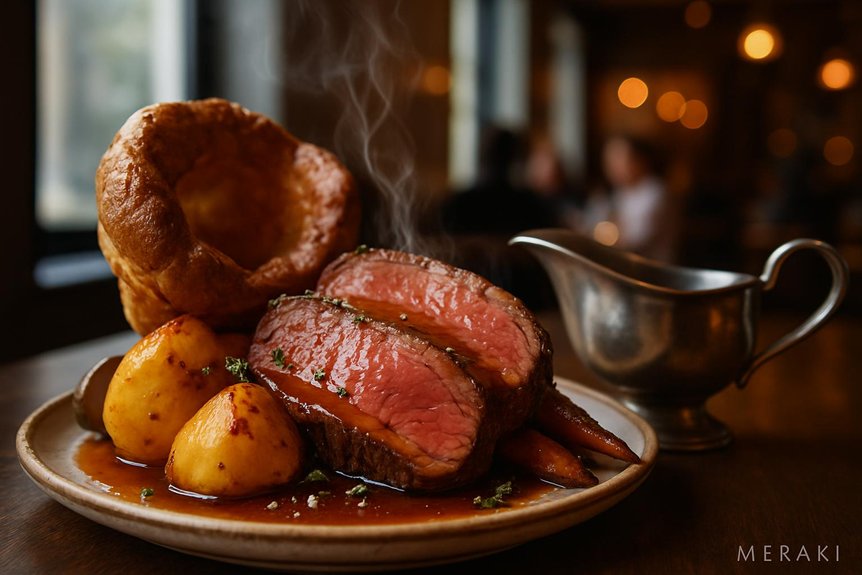Meraki presents a Sunday roast that asks to be taken seriously. The kitchen pairs carefully sourced cuts with precise cookery, vegetables that respect the season and sauces that lift without overpowering. Service is attentive but unshowy; the room feels like a well-kept ritual. There are particulars worth noting — from Yorkshire puddings to timing — that reveal why it has become more than a meal.
Why Meraki’s Roast Stands Out
What makes Meraki’s Sunday roast distinctive is its rigorous attention to ingredient quality and balance. The kitchen sources seasonal produce and artisanal accompaniments to create a composed plate where textures complement rather than compete.
Roast vegetables are caramelized but restrained; gravies are clarified and seasoned to elevate without overwhelming. Thoughtful seafood pairing appears on occasion, offering smoked salmon or mussel consommé courses that contrast richness with briny brightness. At Meraki, the extensive wine menu prioritizes Greek wines, adding a layer of authenticity to the dining experience.
For non-meat diners, vegan options receive equal care: hearty nut roasts, charcoal-roasted roots, and umami-rich lentil ragouts with herb-forward sauces. Service emphasizes timing and portioning so each element arrives at *ideal* temperature.
The result is a Sunday roast experience defined by restraint, coherence, and purposeful contrasts.
The Meat: Cuts, Cookery, and Quality
When selecting meat for its Sunday roast, Meraki prioritizes provenance and technique: prime cuts are sourced from British farms practising rotational grazing, dry-aged where appropriate, and trimmed to preserve flavor without excess fat. The kitchen focuses on cut selection—rib, sirloin and shoulder—each chosen for texture and cooking profile. Marbling and aging techniques are assessed to balance succulence with depth of taste; visible intramuscular fat guides cooking times and resting periods. Sourcing local butchers ensures traceability, consistent quality and relationships that allow bespoke joint preparation. Cooking methods favor low-and-slow roasting or high-heat finishes depending on cut, with careful temperature control to achieve desired doneness. Presentation highlights the meat’s integrity rather than heavy embellishment. Meraki’s open kitchen is led by celebrity chef Athinagoras Kostakos, ensuring that each dish meets the highest standards of quality and flavor.
Vegetables, Sides, and Seasonal Flavour
Meraki’s vegetable selection and accompanying sides are curated to complement the roast’s richness while highlighting seasonal produce. Root vegetables are caramelized to deepen sweetness, brassicas are blanched then charred to retain texture and brightness, and roasted new potatoes are finished with sea salt and rosemary to provide a crisp, aromatic counterpoint. The kitchen sources seasonal vegetables to reflect market availability, adjusting plates as farms supply early spring shoots or autumn squash. Creative sides balance heft and freshness: tangy pickled shallots, buttered greens with lemon oil, and a nutty gratin for contrast. Portions are composed to vary mouthfeel and temperature, presenting a cohesive plate that supports the meat without overpowering it. Presentation remains unfussy, focused on flavour and seasonality. Inspired by Aegean islands, Meraki’s menu infuses a cosmopolitan Greek atmosphere that enhances the dining experience.
Yorkshire Pud, Gravy, and Sauces Worth Celebrating
A perfectly risen Yorkshire pudding provides the essential lift to Meraki Restaurant London’s Sunday roast, its hollow interior and crisp, golden shell designed to catch gravy and sauces without becoming soggy.
The kitchen presents Yorkshire pudding varieties that range from traditional beef-drippings to smaller, herb-infused versions for lighter appetites. Sauces are treated with equal care: beef jus is clarified and reduced, while pan gravies receive subtle gravy enhancements such as roasted bone concentrate or shallot confit to intensify umami.
Sauce pairings are chosen to balance richness—horseradish cream with roasted beef, red wine reduction for lamb, and a tangy cider gravy for pork. Each element is calibrated so pudding, gravy and sauces harmonize without overpowering the roast’s centrepiece.
Atmosphere, Service, and Sunday Vibes
Meraki’s dining room balances a cozy, lively ambience that suits both quiet meals and bustling weekend crowds.
Staff remain consistently attentive and friendly, guiding diners through the roast options and timing courses with care.
Regulars treat Sunday service as a ritual, arriving for familiar flavors and the warm, communal atmosphere.
Cozy, Lively Ambience
Sunlight filters through tall windows onto wooden tables, where the hum of conversation and clinking cutlery creates a warm, convivial backdrop for Sunday roast service.
The dining room balances a cosy atmosphere with a lively ambiance: muted lighting and plush seating invite relaxed conversation, while soft music and periodic laughter keep energy buoyant.
Tables are arranged to allow privacy without isolating guests, and seasonal greenery adds subtle color.
Aromas of roasted meat and herbs thread through the space, enhancing appetite and communal feeling.
Timings are paced to suit groups and solo diners alike, promoting unhurried enjoyment.
Attentive, Friendly Staff
Complementing the warm room and lively chatter, the staff move with practiced ease—greeting guests by name, anticipating needs, and balancing attentiveness with unobtrusive service.
Observers note a consistent level of staff professionalism that reinforces relaxed dining etiquette without stiffness. Servers read the table’s tempo, suggesting courses, clearing plates promptly, and offering wine with confident, unobtrusive timing.
Interactions feel sincere rather than scripted, fostering comfortable Sunday vibes where questions are answered knowledgeably and special requests handled discreetly.
The team’s demeanor complements the restaurant’s tone: polished but approachable.
- Polite introductions and table awareness
- Timely, unobtrusive course management
- Knowledgeable menu and wine guidance
- Respect for personal space and pace
- Discreet handling of special requests
Weekend Roast Rituals
When the weekend arrives, the dining room settles into a familiar rhythm: low conversation, the clink of cutlery, and servers moving with quiet purpose to orchestrate the Sunday roast. Meraki’s atmosphere balances warmth and restraint; natural light and soft music permit conversation without intrusion.
Service follows practiced choreography: courses arrive promptly, plates cleared discreetly, timing tuned so joints rest before carving. Staff suggest pairing beers from a curated list to complement rich gravies and crisp crackling, and they guide diners through wine alternatives.
Vegetarian options receive equal care—seasonal roots, nut roasts, and roasted cauliflower are presented with the same attention to texture and sauce. The result is a reliable, convivial ritual that turns Sunday dining into a modest weekly celebration.
Tips for Booking and Making It a Ritual
Meraki recommends booking early-afternoon slots to secure a table when the roast service is at its freshest.
Regulars can set a weekly reservation routine to turn the meal into a dependable weekend habit.
Encouraging patrons to bring friends or family transforms the roast into a communal tradition.
Best Time to Reserve
A table booked for early afternoon on Sunday secures the best experience: it avoids the midday rush, guarantees access to sunlit window seats, and gives diners ample time to linger over second helpings without feeling rushed.
Meraki’s staff recommend booking at least one week ahead for regular Sundays and earlier for holiday weekends; reservation timing shapes seating choice and course pacing.
Guests who treat bookings as a small ritual tend to enjoy smoother arrivals and personalized service.
- Aim for a 1–2pm slot to catch natural light and steady kitchen flow.
- Call or book online midweek to avoid last-minute scarcity.
- Note special menus and extended hours during holidays.
- Request a consistent table to build rapport with staff.
- Confirm 24 hours ahead to prevent no-shows.
Weekly Reservation Routine
Because weekly reservations build momentum, regular diners treat booking as a small ritual that guarantees continuity and better service. By setting a consistent day and time—preferably the recommended 1–2pm slot—patrons secure preferred seating, reduce last-minute stress, and create a predictable pattern staff can accommodate.
Establishing a simple reservation planning checklist—preferred table, dietary notes, and contact details—streamlines repeat bookings and minimizes misunderstandings. Automated calendar reminders and brief confirmation messages maintain the habit without fuss.
Treating the reservation as part of broader Sunday traditions reinforces its role in weekly rhythms, encouraging punctuality and mutual expectations between guests and staff.
Over time, this routine often yields smoother service, subtle prioritisation, and a more relaxed, reliable dining experience.
Bring Friends or Family
Inviting friends or family transforms a Sunday roast into a repeatable ritual that strengthens bonds and eases logistics. Groups should choose a consistent organizer, agree on a preferred time (the 1–2pm window remains ideal), and set simple roles—who books, who communicates dietary needs, who handles transport—to reduce friction.
The organizer secures the Meraki reservation and circulates confirmations. Alternating hosts preserves family traditions while allowing different members to contribute.
For larger parties, pre-ordering or selecting set menus speeds service and ensures dietary requirements are met. Making the roast a calendar event—same weekend each month—builds anticipation and solidifies a friends gathering into routine.
- Designate an organizer
- Fix a standard time
- Share dietary information
- Use pre-orders for large groups
- Rotate responsibilities
Conclusion
Meraki concludes the Sunday roast conversation with an assurance that few London tables can match: its meats, vegetables, and sauces sing in practiced harmony. Guests find a ritual that feels both timeless and curated, where service anticipates needs and conviviality arrives on the plate. Seasonal freshness and meticulous cookery elevate familiar comforts into something almost mythic, while thoughtful bookings and shared routines make certain each visit becomes a reliably delightful, communal celebration of flavour and hospitality.
